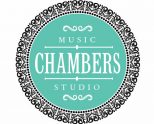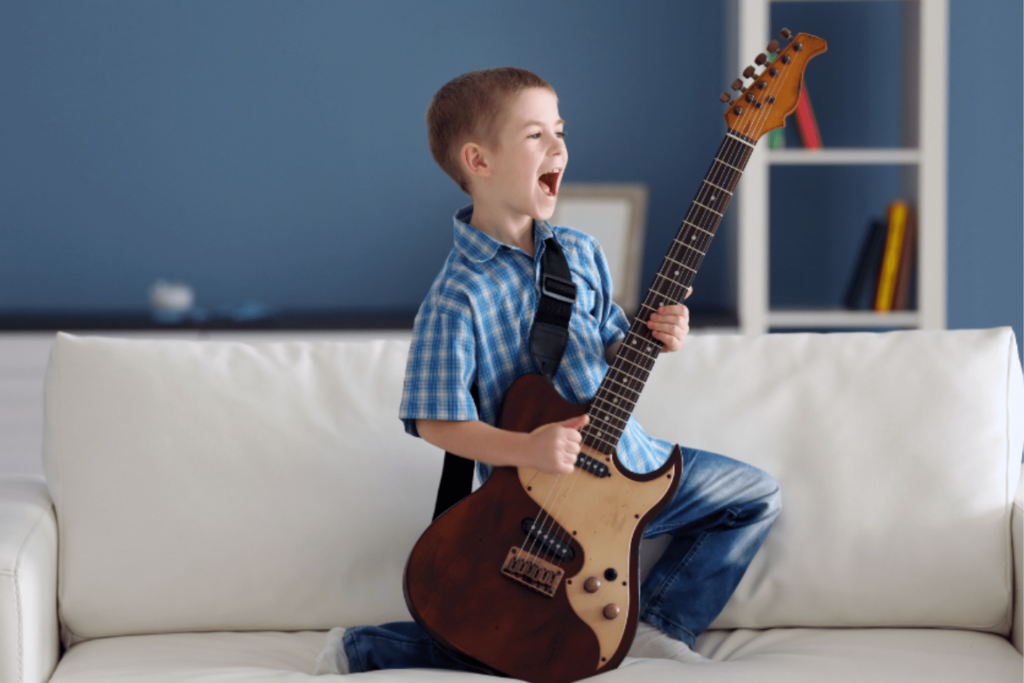You watch as your child strums the air with unbridled enthusiasm, mimicking the chords of a song playing on the radio. Their hands move with a surprising rhythm, and a grin lights up their face with every pretend note.
Could your child be ready for guitar lessons? Here’s everything you need to know about the best age to start guitar lessons.

What Is The Best Age to Start Guitar Lessons?
The general consensus is that the best age to start guitar lessons is 7 years old. This recommendation is based on several developmental factors such as physical hand size, cognitive ability to follow instructions, and willingness to practice regularly.
For those younger than 7, starting with ukulele lessons is advised. The ukulele is a smaller and simpler instrument to handle for little hands. Plus, it serves as a perfect introduction to stringed instruments, preparing younger children for the transition to guitar.
So how can you determine if your child is ready to pick up a guitar? Let’s look at the top signs of readiness for guitar lessons.
8 Signs Your Child Is Ready to Start Guitar Lessons
Your child is showing interest in music, and more specifically, in guitar. What do you do next? Here are some signs that your next move is getting them into the studio.
They show a strong interest in guitar.
When your child air-strums to their favorite songs or is captivated by guitar performances, it’s a clear sign of their interest. This genuine curiosity often means they’ll enjoy and engage with lessons, making learning a fun experience.
They can focus for at least 30 minutes.
Learning the guitar requires attention to detail and persistence. If your child can concentrate on a single activity for half an hour, they’re likely ready to handle the structure of guitar lessons.
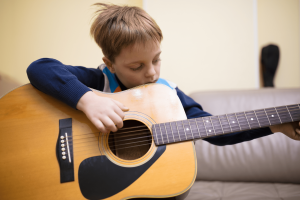
They’re motivated to practice.
Practice is key in mastering the guitar. Children who ask to practice or who show initiative in learning more about the guitar demonstrate not just a fleeting interest but a deeper passion for music.
They have basic finger dexterity.
The ability to move fingers independently and press down strings is crucial for forming chords and playing notes. Early skills in tasks requiring fine motor skills suggest they might be ready to tackle the guitar.
They have basic motor skills.
Coordination and the ability to handle a guitar comfortably are essential. If your child can easily manage tasks that require a bit of physical coordination, they might be set for guitar lessons.
They can follow instructions.
The willingness and ability to listen to and follow through with instructions from a teacher are vital for learning and progress. It ensures that lessons are both productive and enjoyable.
They have the ability to receive feedback.
A certain level of maturity is needed to commit to learning an instrument, understanding that progress comes over time, with practice and patience.
They show signs of basic rhythm.
A natural inclination towards rhythm and the ability to keep time can greatly enhance their learning process, making it easier to pick up songs and understand musical patterns.
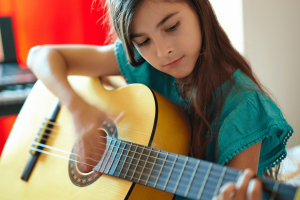
Benefits Of Children Learning Guitar
There’s so many benefits to musical learning, it’s hard to list them all! But we’ll give it our best shot—here are some of the top benefits of guitar lessons for children:
Enhances cognitive development.
Learning guitar stimulates the brain, enhancing memory as kids learn and retain various chord shapes and progressions. It’s a mental workout that boosts cognitive skills, including problem-solving and decision-making abilities, as they navigate through songs and melodies.
Improves fine motor skills.
Guitar playing refines fine motor skills, requiring precise finger movements and coordination. As children practice finger placement and strumming, they develop dexterity and agility in their hands and fingers, skills that are transferable to other areas of life.
Offers a positive outlet for emotional expression.
Music is a powerful tool for emotional expression. Playing the guitar allows children to channel their emotions into something beautiful and expressive, serving as a healthy outlet for feelings and stress.
Encourages social interaction in group lessons and live musical performances.
Participating in group lessons and performances promotes social skills. It’s a chance for children to connect with peers who share similar interests.
Cultivates a lifelong appreciation for music.
Starting guitar lessons at a young age lays the groundwork for a lifelong appreciation of music. It opens children’s eyes to the richness of the musical world, inspiring a deep and enduring love for music that will follow them long past the days of guitar lessons.
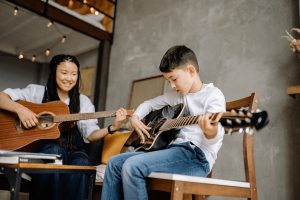
Beginner Guitar Player Tips
Now that the benefits of learning to play guitar are clear, let’s talk about how to learn guitar with a few pro tips.
- Select the right guitar. Finding a guitar that’s comfy for your hands makes all the difference. It should be just the right size, so playing feels like fun, not a chore.
- Use a guitar pick. A pick can help make the strings sing, especially when you’re just starting. It makes playing clearer notes a bit easier.
- Practice often. Practicing a little bit every day is like magic for getting better. It’s all about making small improvements and sticking with it.
- Start with light gauge guitar strings. Light strings are way easier on your fingers, making it more comfortable to learn and less ouchy- trust us, guitar players build up quite the callouses!
- Buy an electric tuner. Keeping your guitar in tune is super important for sounding great. An electric tuner can be your best friend here.
- Play the guitar with others. Jamming with friends can be fun and provides valuable learning experiences. Plus, it’s cool to share what you’re learning.
What If My Child Is Too Young to Start Guitar Lessons?
If your child is showing interest in music but isn’t quite ready for guitar lessons, don’t fret! The ukulele is a fantastic alternative for younger musicians.
Its smaller size and fewer strings make it easier for little hands to navigate, offering a less daunting introduction to stringed instruments. Starting with a ukulele can build a solid musical foundation, encouraging basic skills like rhythm and coordination in a fun, accessible way.
Chambers Music Studio offers ukulele lessons specifically designed for younger children, making it a perfect stepping stone towards guitar mastery in the future.
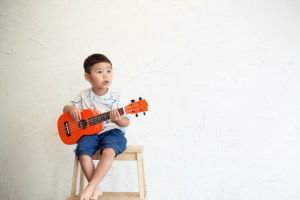
The Best Age to Start Guitar Lessons: Frequently Asked Questions
Can a 3-year-old learn guitar?
While a 3-year-old might be a bit young for the traditional guitar, ukulele lessons are a fantastic alternative. They offer a wonderful introduction to stringed instruments, tailored to smaller hands and shorter attention spans.
How long should a child practice guitar?
Children can start with 5 minutes of practice a few times a week and build their stamina over time, but practice isn’t a strict requirement. We know families are busy, so children should just play whenever they can. Even if they miss practice for a length of time, coming to lessons regularly is enough to keep them on track.
What is the best age to start electric guitar?
Playing an electric guitar can be exciting at any age, but around 7 or older is ideal—once they’ve got a bit of physical strength and focus.
Ready For Your Child to Start Guitar Lessons?
Chambers Music Studio offers expert instructors passionate about fostering young talents. We offer beginner guitar lessons tailored to kids’ unique learning styles. Whether it’s finding the joy in strumming their first chord or mastering a new song, your child’s musical adventure starts here.
Enroll in guitar lessons today and watch your child’s confidence, creativity, and love for music flourish!
